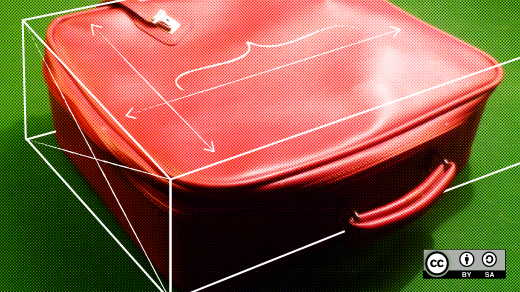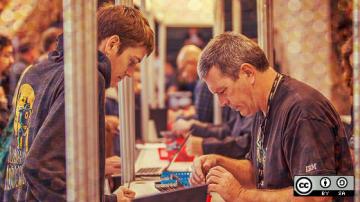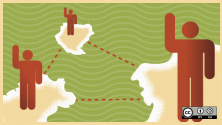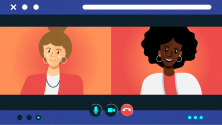Looking ahead to the 2019 open source conference season is both exciting and daunting. There are so many great conferences to attend, choosing among them depends on your interests. Here are some of the larger conferences that might catch your eye:
- LinuxConf AU (January 21-25 in Christchurch, New Zealand)
- FOSDEM 19 (February 2-3 in Brussels, Belgium)
- ScaLE 17x (March 7-10 in Pasadena, CA)
- DrupalCon (April 8-12 in Seattle, WA)
- PyCon (May 1-9 in Cleveland, OH)
- Open Source Summit (August 21-23 in San Diego, CA)
- All Things Open (October 13-15 in Raleigh, NC)
- LISA19 (October 28-30 in Portland, OR)
- SeaGL (Seattle, WA in November)
Having attended and spoken at numerous conferences over the years, I thought it would be helpful to share some advice on how to make the most of the 2019 conference season. Open source contributors have limited time to spare, so let’s make the most of our time together to learn, grow, and expand our open source communities.
Before you go
- Register – Make sure that you are registered for the conference. If you know you will attend a particular event, save money with early-bird registration. When you arrive, take advantage of early badge pickup to avoid long lines on the first day.
- Check the agenda – Check out the conference agenda before you go and come up with a general game plan. Dig the keynotes? Find a good seat. If you’re more into networking and meeting people, make that a priority. If you’re going for knowledge, earmark the sessions that look most interesting.
- Identify key sessions – When deciding which sessions to attend, pick a second and third back-up in case the session you want is full. If you really want to attend a particular session, get there early (this might mean attending the session before the one you want, assuming you don’t need to leave the room to re-enter). If some sessions are being recorded, you may want to attend live ones instead and watch the recorded sessions later.
- Plan transportation – Make sure to book your travel and hotel well in advance. Decide if you’ll use public transit, ride shares, or drive. Pro tip: I avoid rental cars unless I need to be mobile. For most conferences, transportation involves simply getting to and from the airport and the conference hotel, so public transit is usually a good option. The conference website will usually have travel details for you. For more travel advice, check out the Bacon Travel Survival Guide.
- Check the weather– Before you leave, check the weather forecast so that you will pack appropriate clothing and gear. Of course, you can always purchase forgotten items, but that wastes precious conference time.
- Delegate your work – If you have daily responsibilities at work, ask for help. Ask your teammates to back you up while you’re out and plan for any work-related issues that might come up. Set your email to "out of office" to set expectations about response time.
While you're there
- Get oriented – Once you arrive at your hotel, familiarize yourself with your surroundings. Figure out how long it takes to get from your hotel room to the conference location and add an extra 10-15 minutes for the first day to account for traffic or other delays. I always choose several breakfast options in advance to take care of the most important meal of the day.
- Take care of yourself – If you don’t stay healthy, your conference experience can implode quickly. Make time for exercise: Get up early and explore the city on foot for a while, or hit the hotel gym for cardio or weights. Not a morning person? Simply walking around the hotel can help boost your energy and get you going. Plan for sleep and avoid staying out too late on the first few nights. Finally, if you’re feeling the brain drain, skip a session and attend the hallway track, or go back to your room for some rest.
- Eat healthily – Eating healthy food when you travel can be a challenge. Yelp can be a great resource for finding dining options; I've had great luck finding convenient breakfast spots as well as terrific restaurants to take new friends to dinner. If you’re new to a conference, ask other attendees for recommendations; they might even join you for some networking.
- Be present – You’re finally at the conference, but you’re worried about work (even though you’ve made arrangements in order to be present—see #6). You’ll be spending long days meeting people and absorbing new content, so be sure to maximize your time and remain present. This is critical, especially if you don't have the chance to attend many conferences. Make the most of the time you have at the conference.
- Take notes – The average conference attendee now carries something like 2.5 devices, but a pen and paper will do. Take notes: Jot down key takeaways, resources, and names of people you meet. Business cards are still a thing, and most conferences also include QR codes on badges for you to scan contact information. These notes will help you reflect and follow up later on what you’ve learned.
- Use social media – At one of my first open source conferences, I was introduced to Twitter. I didn’t get it at the time, but I went along with the suggestion to be more social online. You'll find an entire back channel and many conversations happening on social media during conferences. Learn and use the conference hashtag, take and share pictures, offer your key takeaways, tag speakers and new friends, and join online conversions.
- Network – There will be many opportunities for you to network with other conference attendees, even if it's just during on-site breakfasts or lunches. Other opportunities include conference Birds of a Feather (BoF) sessions, evening functions, and off-site events. Take advantage of the opportunity to meet new people and expand your personal and professional networks.
After the conference
- Write a report – Writing a short event report is extremely useful: It helps document how much the event costs (time, travel, lodging, speaking opportunities, and any sponsorships from your company) and makes a case for the event's value. I always include key connections made, major takeaways, and notes to share with my team.
- Share your knowledge – It’s a privilege to attend a conference. Often it's a reward for great work. Share your notes with your team, or publish them more broadly, but be sure to share what you’ve learned.
- Reflect – After the dust has settled and you’ve cleared through the work that piled up while you were gone, take some time to reflect. Take note of any major takeaways and think about whether you need to make any changes. This is also a good time to do a brief start, stop, continue exercise.
- Follow up – When you get back to work, you’ll likely have a mountain of things to attend to, including email, expense reports, and other work. But it's important to carve out some time to follow up with the connections you made. Refer to your notes, business cards, or social media to jog your memory on key connections. Even a simple note to say "it was nice to meet you" can make a differnece—you never know how that connection might pay off in the future.
- Write thank-you notes – If you’ve made valuable connections or had a great experience with the conference organizers, send a hand-written thank-you note. This lost art might take a few extra minutes, but it's worth the effort.
- Complete your expense report – Sure, expense reports are a pain, but you want to get reimbursed for the money you spent while traveling. I always complete my expense report from the most recent conference before going to the next one. Here's one of my favorite tips: Jot down all your meals, transit, service tips, and other expenses on a piece of paper to help keep track of all the little things. I use the notepad from the hotel room to track each day's details; it’s super helpful when I need to complete my final expense report.
I hope these tips will help you make the most of the 2019 conference season. No matter what conferences you attend, plan on learning, networking, and growing our open source communities.
Got some tips of your own? Share them in the comments.







1 Comment